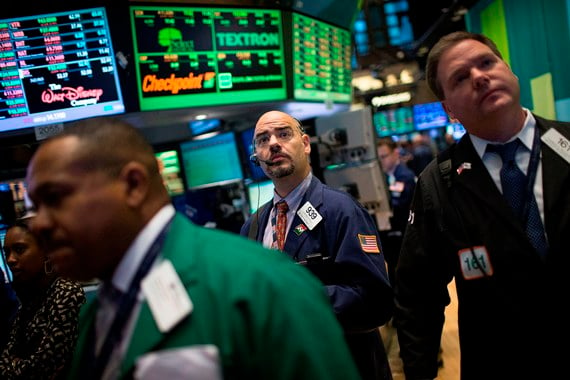Advisers and investors this month are seeing surprising and, in many cases, misleading first-quarter returns as a result of a trading-exchange glitch that affected some heavily used exchange-traded funds.
As a result of the computer-server difficulties on March 31 at the New York Stock Exchange Arca, the typical amount of information about buyers and sellers around the time the market closed was not provided, according to traders.
That “caused some of these funds to close way off their fair value, which considering it was quarter-end is a pretty big deal,” an ETF specialist at KCG, a Wall Street trading firm, wrote in a note to clients Monday.
The glitch affected about 160 ETFs in all. Those affected included firms such as the Vanguard Group Inc., and investment-adviser clients who use their ETFs. Firms that traded the products may have received poor pricing, and even those that didn't were stuck with funds whose prices swung dramatically from the actual underlying value of the securities they held.
One firm feeling the impact was Bank of America Merrill Lynch, according to Jon D. Maier, who runs scores of ETF-based portfolios for some of the firm's 14,000 financial advisers.
The firm's large position in a fund affected by the exchange issue, the Vanguard Growth ETF (VUG), caused the performance of one of its portfolios to drop by some 70 basis points, Mr. Maier said.
One hundred basis points equals 1%. In the world of tactical asset allocation — an active-management strategy where success is fleeting and almost every basis point of “excess return” or “alpha” beyond a benchmark is valuable — that's a sizable figure.
Mr. Maier discussed the incident at an industry conference in New York last week. Bank of America Merrill Lynch declined to comment further through a spokeswoman, Susan McCabe.
The funds have since bounced back to normal trading, meaning any artificial high or low performance has been corrected in time for future reporting periods. And the scale of the issue, on what traders described as a quiet day of trading, is impossible to determine. Some other traders and portfolio managers said they were not greatly affected. But investors who look at performance data produced on the basis of market-at-close ETF prices at the end of the quarter will see unexpected results.
The full reasons behind the glitch at a major electronic bourse for ETFs in the U.S., the NYSE Arca, have not been disclosed. A spokesman for the exchange, Eric Ryan, declined to comment, pointing to a
brief alert sent out that day to traders.
Vanguard said the closing prices of three of its ETFs, including VUG, saw closing market prices that deviated unexpectedly from the value of their underlying holdings on March 31. VUG had a price equivalent to a discount of 2.77% on its underlying value. The Vanguard Mid-Cap ETF (VO) had a price 3.05% higher than its underlying stocks and cash. And the Vanguard Small-Cap Growth ETF (VBK) had a discount of 1.49%, according to a statement by Vanguard.
Typically, those funds trade at premiums or discounts that are magnitudes smaller, measured in the one-hundredths of a percentage point. The three funds manage $34 billion and, on an average day, account for about $169 million in trades, according to ETF.com, a researcher.
When large premiums or discounts develop, large traders generally step in and effectively either create or destroy ETF shares until they trade closer in line with their value. But to do that, they want to insure against, or hedge, their risks by trading other securities.
It's difficult for them to do both at the same time at the close, because ETFs and their underlying stocks stop trading for the day at the same time. In order to prevent price discrepancies, exchanges generally provide information around the market's close that helps them anticipate and hedge against market imbalances.
That didn't happen on March 31. Instead, traders lacked certain data on a range of Arca-listed securities, ranging between the ticker symbols UTG-ZSML, which had stopped trading earlier because of related difficulties.
The issue is a reminder of the importance of best practices in trading ETFs and explaining the occasional quirks of the market to clients, according to Joel M. Dickson, global head of investment research at Vanguard.
Echoing a number of other ETF analysts, Mr. Dickson said investors should avoid or use extra caution when trading around the market open or close. And he said they should use limit orders, rather than market orders, to insure proper trade execution.
“This really was not an ETF issue,” he said. “It was a technology failure at the exchange that could've affected a whole different set of securities.”
But the issue comes as more advisers are learning how to use ETFs properly. The funds now manage $2 trillion and work very differently from mutual funds, a product from which they are stealing market share. Mutual fund investors always buy and sell shares at a price equal to their underlying net asset value.
“There's a lot of these weird things in ETFs,” said Matthew Tuttle, chief executive at Tuttle Wealth Management and an ETF strategist. “Because ETFs are still new and still different, I think that it's really an obligation for the ETF issuers to help out because bad trades reflect badly on us.”







